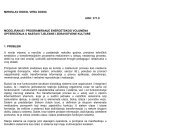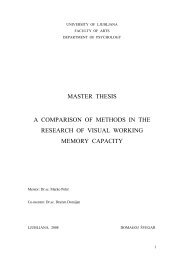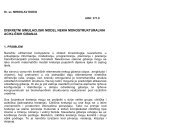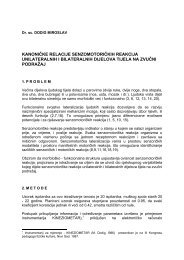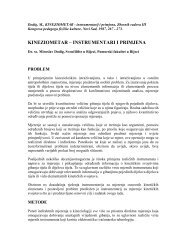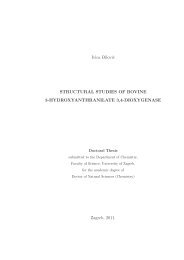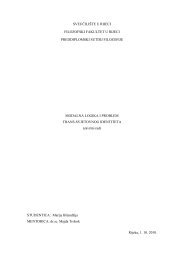Investigating Macroeconomic Determinants of Happiness in ...
Investigating Macroeconomic Determinants of Happiness in ...
Investigating Macroeconomic Determinants of Happiness in ...
You also want an ePaper? Increase the reach of your titles
YUMPU automatically turns print PDFs into web optimized ePapers that Google loves.
Gross domestic product (GDP)<br />
Economists usually assume that higher GDP <strong>in</strong>creases happ<strong>in</strong>ess. Consequently,<br />
utility is presumed to be an <strong>in</strong>creas<strong>in</strong>g function <strong>of</strong> GDP. However, psychologists disagree.<br />
The impact <strong>of</strong> GDP on happ<strong>in</strong>ess is typically observed between countries, over time and<br />
between <strong>in</strong>dividuals with<strong>in</strong> the same country. People <strong>in</strong> rich countries are generally found to<br />
be happier than people <strong>in</strong> poor countries. To be more precise, the literature has established<br />
that happ<strong>in</strong>ess <strong>in</strong>creases with <strong>in</strong>come for low-<strong>in</strong>come countries. Consensus has not as yet been<br />
reached on whether there is a po<strong>in</strong>t beyond which additional <strong>in</strong>crements <strong>in</strong> GDP per capita are<br />
associated with no change <strong>in</strong> happ<strong>in</strong>ess. Furthermore, the observed positive correlation<br />
between GDP and happ<strong>in</strong>ess across countries might not all be attributable to higher <strong>in</strong>come.<br />
There are other factors such as democracy, human rights, health and distributional equity that<br />
may make happ<strong>in</strong>ess rise with <strong>in</strong>come. Easterl<strong>in</strong>’s (1974) sem<strong>in</strong>al paper <strong>in</strong>vestigates the<br />
relationship between happ<strong>in</strong>ess and GDP over time. In the period 1946-1991 it was shown<br />
that, even though real per capita GDP <strong>in</strong>creased <strong>in</strong> the USA, the average happ<strong>in</strong>ess dropped<br />
(Frey and Stutzer, 2002a). This is usually expla<strong>in</strong>ed through chang<strong>in</strong>g aspirations, whereby<br />
people change their aspirations as their <strong>in</strong>come rises, hence an <strong>in</strong>crease <strong>in</strong> <strong>in</strong>come does not<br />
result <strong>in</strong> a proportionate <strong>in</strong>crease <strong>in</strong> happ<strong>in</strong>ess. F<strong>in</strong>ally, rich people need not necessarily be<br />
happier than the poor ones with<strong>in</strong> the same country. What is found to matter the most from an<br />
<strong>in</strong>dividual’s perspective is his/her relative <strong>in</strong>come position. Namely, <strong>in</strong>dividuals do not value<br />
absolute <strong>in</strong>come, but rather compare it to the <strong>in</strong>come <strong>of</strong> relevant others (their reference group)<br />
(Frey and Stutzer, 2002a).<br />
All <strong>in</strong> all, GDP variable should be <strong>in</strong>cluded <strong>in</strong> the happ<strong>in</strong>ess equation <strong>in</strong> two ways.<br />
Firstly, <strong>in</strong>clusion <strong>of</strong> the <strong>in</strong>come group, that an <strong>in</strong>dividual perta<strong>in</strong>s to, will allow us to asses the<br />
impact <strong>of</strong> one’s relative <strong>in</strong>come position. In addition, we should also account for a general<br />
level <strong>of</strong> <strong>in</strong>come <strong>of</strong> the population, by <strong>in</strong>clud<strong>in</strong>g GDP per capita as an additional variable.<br />
Government expenditure<br />
S<strong>in</strong>ce this is our ma<strong>in</strong> variable <strong>of</strong> <strong>in</strong>terest we analyse it <strong>in</strong> more depth. Government<br />
<strong>in</strong>volvement <strong>in</strong> the economy, typically measured by the share <strong>of</strong> government expenditures <strong>in</strong><br />
national output, might <strong>in</strong>fluence the subjective happ<strong>in</strong>ess through various channels and <strong>in</strong><br />
different directions. Firstly, given that government expenditures are f<strong>in</strong>anced partly through<br />
taxes paid by the citizens, one can argue that changes <strong>in</strong> government expenditures directly<br />
<strong>in</strong>fluence changes <strong>in</strong> life satisfaction. Citizens prefer lower taxes <strong>in</strong> order to have higher<br />
9



